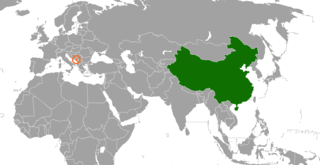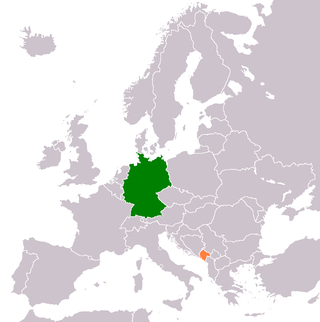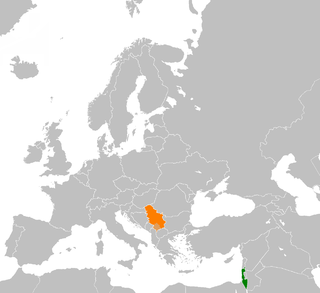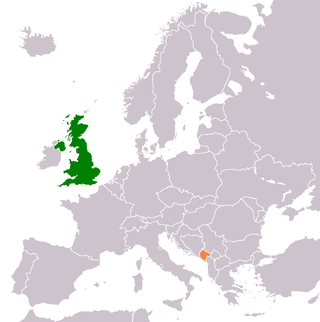
Since the breakup of the Socialist Federal Republic of Yugoslavia in the early 1990s, the foreign policy of the newly established Federal Republic of Yugoslavia was characterized primarily by a desire to secure its political and geopolitical position and the solidarity with ethnic Serbs in other former Yugoslav republics through a strong nationalist campaign. While the country was involved in Yugoslav Wars and therefore exposed to several rounds of devastating sanctions against Yugoslavia this involvement was often denied for political or ideological reasons. In the initial period Federal Republic of Yugoslavia unsuccessfully aspired to gain international recognition as the sole legal successor state to SFR Yugoslavia, the country which was one of the most prominent foreign policy subjects during the Cold War.

In a referendum on 21 May 2006, the people of Montenegro opted to leave the State Union of Serbia and Montenegro. This result was confirmed with a declaration of independence by the Montenegrin parliament on 3 June 2006. It simultaneously requested international recognition and outlined foreign policy goals.

According to the 2012 U.S. Global Leadership Report, 26% of Montenegrins approve of U.S. leadership, with 48% disapproving and 26% uncertain.

The following outline is provided as an overview of and topical guide to Montenegro:

The foreign relations between Croatia and Montenegro are bound together by shared history, intellectual development, and common geography. Both states are members of the Council of Europe and NATO. Montenegro has been a candidate to join the European Union since 2012, a pursuit supported by Croatia, who has been an EU member since 2013. Their diplomatic relations have been friendly and amicable, with strong political and economic collaboration. Small border disputes have remained unresolved between the two states since the dissolution of Yugoslavia, as do some shipping and naval disagreements.

Montenegro–Russia relations are foreign relations between Montenegro and Russia. Montenegro has an embassy in Moscow and Russia has an embassy in Podgorica.

China–Montenegro relations are foreign relations between the People's Republic of China and Montenegro. People's Republic of China has officially recognized Montenegro on June 14, 2006. Diplomatic relations between the two countries were established on July 7, 2006. China transformed its consulate into an embassy in Podgorica on July 7, 2006. The Montenegrin embassy in China opened in Beijing on November 13, 2007.

Montenegrin–Slovenian relations are foreign relations between the Montenegro and Slovenia. Until 1991, both countries were part of Yugoslavia. Slovenia recognized Montenegro's independence on June 20, 2006. Both countries established diplomatic relations on June 21, 2006. Montenegro has an embassy in Ljubljana. On June 23, 2006, Slovenia opened its embassy in Podgorica.

Kosovo–Montenegro relations are foreign relations between Kosovo and Montenegro. Montenegro has a 78.6 km (48.8 mi)-long border with Kosovo. It was the 49th state to recognise Kosovo's independence.

The Ministry of Foreign Affairs of the Republic of Serbia is the ministry in the government of Serbia which is in the charge of maintaining the consular affairs and foreign relations of Serbia. The current minister is Ivica Dačić, in office since 26 October 2022.

German-Montenegrin relations are foreign relations between Germany and Montenegro. Both countries established diplomatic relations on 14 June 2006. Germany has an embassy in Podgorica. Montenegro has an embassy in Berlin and a general consulate in Frankfurt. Both countries are members of Council of Europe and NATO. Also Germany is an EU member and Montenegro is an EU candidate. In 1997 the German Bundeswehr used the Podgorica Airport for the Operation Libelle, which led to the first skirmish involving German forces since World War II.

The diplomatic relations between Israel and Serbia were established on January 31, 1992, when Serbia was part of FR Yugoslavia. Israel has an embassy in Belgrade and Serbia had an embassy in Tel Aviv. Yugoslavia was the second country in Europe to recognize Israel in 1948. The two countries have economic and cultural ties, helped by a sizable community of Jews from the former Yugoslavia in Israel. Serbia agreed to move its embassy to Jerusalem on 4 September 2020 but decided not to after Israeli recognition of Kosovo as a sovereign state.

Both Montenegro and the Republic of North Macedonia are full members of the Council of Europe and of the NATO. The Foreign Ministry of North Macedonia states the two countries have excellent political ties, without any open issues between the two countries. The embassy of North Macedonia to Montenegro is located in the capital city of Podgorica. Montenegro's embassy in North Macedonia is also located in the country's capital city, which is Skopje. Also, Montenegro has an honorary consulate in the city of Bitola.

Montenegro–United Kingdom relations are the bilateral relations between Montenegro and the United Kingdom. Both nations are members of the Council of Europe and NATO and had fought on the same side in both World War I and World War II.

Montenegro–Turkey relations are the bilateral relations between Montenegro and Turkey. Turkey officially recognized Montenegro on June 12, 2006. Diplomatic relations between the two countries were established on July 3, 2006. Both countries are full members of the Union for the Mediterranean, Council of Europe and NATO.

On 22 February 2018, a Serbian-born man threw an explosive grenade inside the embassy of the United States in Podgorica, the capital of Montenegro. He then blew himself up outside the compound with another explosive. The attack occurred around midnight when the embassy was closed, and nobody was wounded. Russian authorities denied any involvement.

The diplomatic relations between Azerbaijan and Montenegro established in 2008 after Azerbaijan recognized the independence of Montenegro. Azerbaijan has a Diplomatic Office in Podgorica. Montenegro has an embassy in Baku.

Montenegro–Spain relations are the bilateral and diplomatic relations between these two countries. Both countries are full members of the Council of Europe, and of the NATO. Montenegro has an embassy in Madrid. Spain is accredited to Montenegro from its embassy in Belgrade, Serbia.




















